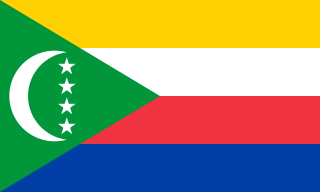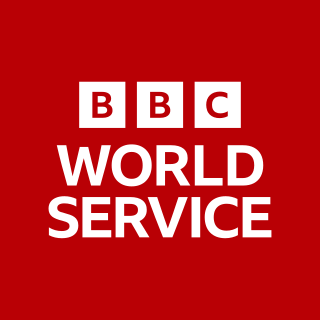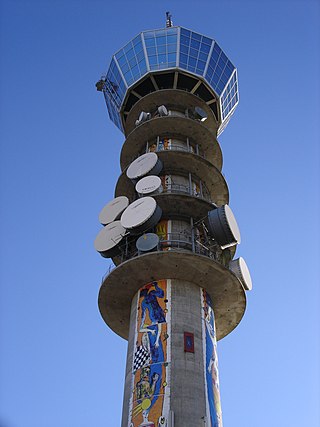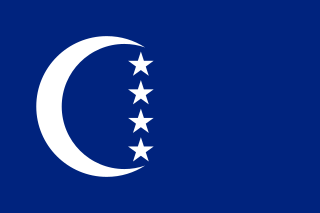Communications in Burundi include radio, television, fixed and mobile telephones, the Internet, and the postal service in Burundi.

The Comoros, officially the Union of the Comoros, is an archipelagic country made up of three islands in Southeastern Africa, located at the northern end of the Mozambique Channel in the Indian Ocean. Its capital and largest city is Moroni. The religion of the majority of the population, and the official state religion, is Sunni Islam. Comoros proclaimed its independence from France on 6 July 1975. A member of the Arab League, it is the only country in the Arab world which is entirely in the Southern Hemisphere. It is a member state of the African Union, the Organisation internationale de la Francophonie, the Organisation of Islamic Co-operation, and the Indian Ocean Commission. The country has three official languages: Shikomori, French and Arabic.
In large part thanks to international aid programs, Moroni has international telecommunications service. Telephone service, however, is largely limited to the islands' few towns.

In November 1975, Comoros became the 143rd member of the United Nations. The new nation was defined as consisting of the entire archipelago, despite the fact that France maintains control over Mayotte.

The BBC World Service is an international broadcaster owned and operated by the BBC. It is the world's largest external broadcaster in terms of reception area, language selection and audience reach. It broadcasts radio news, speech and discussions in more than 40 languages to many parts of the world on analogue and digital shortwave platforms, internet streaming, podcasting, satellite, DAB, FM and MW relays. In 2015, the World Service reached an average of 210 million people a week. In November 2016, the BBC announced that it would start broadcasting in additional languages including Amharic and Igbo, in its biggest expansion since the 1940s.
International broadcasting, in a limited extent, began during World War I, when German and British stations broadcast press communiqués using Morse code. With the severing of Germany's undersea cables, the wireless telegraph station in Nauen was the country's sole means of long-distance communication.

Radio broadcasting is the broadcasting of audio (sound), sometimes with related metadata, by radio waves to radio receivers belonging to a public audience. In terrestrial radio broadcasting the radio waves are broadcast by a land-based radio station, while in satellite radio the radio waves are broadcast by a satellite in Earth orbit. To receive the content the listener must have a broadcast radio receiver (radio). Stations are often affiliated with a radio network that provides content in a common radio format, either in broadcast syndication or simulcast, or both. Radio stations broadcast with several different types of modulation: AM radio stations transmit in AM, FM radio stations transmit in FM, which are older analog audio standards, while newer digital radio stations transmit in several digital audio standards: DAB, HD radio, DRM.
Public broadcasting involves radio, television, and other electronic media outlets whose primary mission is public service. Public broadcasters receive funding from diverse sources including license fees, individual contributions, public financing, and commercial financing, and avoid political interference or commercial influence.

Moroni is the largest city, federal capital, and seat of the government of the Union of the Comoros, a sovereign archipelago nation in the Indian Ocean. Moroni means "at the river". Moroni is the capital of the semi-autonomous island of Ngazidja, the largest of the three main islands of the republic. The city's estimated population in 2003 was 41,557 residents. Moroni, which lies along the Route Nationale 1, has a port and several mosques such as the Badjanani Mosque.

Grande Comore is an island in Comoros off the coast of Africa. It is the largest island in the Comoros nation. Most of its population is of the Comorian ethnic group. Its population as of 2006 is about 316,600. The island's capital is Moroni, which is also the national capital. The island is made up of two shield volcanoes, with Mount Karthala being the country's highest point at 2,361 m (7,746 ft) above sea level. According to the 2009 revision of the constitution of 2002, it is governed by an elected Governor, as are the other islands, with the federal government being much reduced in power. The name Ngazidja is sometimes seen in the now nonstandard form Njazidja.
As of the early 2000s, Sudan had one of the most restrictive media environments in Africa. Sudan's print media since independence generally have served one of the political parties or the government in power, although there occasionally were outspoken independent newspapers.

Radio France Internationale, usually referred to as RFI, is the state-owned international radio news network of France. With 59.5 million listeners in 2022, it is one of the most-listened-to international radio stations in the world, along with Deutsche Welle, the BBC World Service, the Voice of America, and China Radio International.
Mass media in Morocco includes newspapers, radio, television, and Internet.

The Voice of Vietnam is the Vietnamese national radio broadcaster. Directly run by the government of Vietnam, it is tasked promote the policies of the Party and the laws of the state.
Radio Sweden is Sweden's official international broadcasting station. It is a non-commercial and politically independent public service broadcasting company.

Mass media in Kenya includes more than 91 FM stations, more than 64 free to view TV stations, and an unconfirmed number of print newspapers and magazines. Publications mainly use English as their primary language of communication, with some media houses employing Swahili. Vernacular or community-based languages are commonly used in broadcast media; mostly radio.
Mass media in Niger is a diverse collection of public and private entities, both print and broadcast, centered in the capital of Niamey, but with vibrant regional centers. The media has historically been state funded, and focused on radio broadcast media, as the nation's population is spread over great distances. Niamey boasts scores of newspapers and magazines, many of which are fiercely critical of the government. These papers though have very small circulations, and almost none outside the cities.

Mass media in the Democratic Republic of the Congo are nationally and internationally state-owned and operated.

The official languages of the Comoros are Comorian, French and Arabic, as recognized under its 2001 constitution. Although each language holds equal recognition under the constitution, language use varies across Comorian society. Unofficial minority languages such as Malagasy and Swahili are also present on the island with limited usage. According to Harriet Joseph Ottenheimer, a professor of anthropology at Kansas State university, the linguistic diversity of the Comoros is the result of its rich history as part of the Indian maritime trade routes and its periods of Malagasy and French colonial rule.
The Republic of Vanuatu is an officially trilingual state in the western Pacific, the three national languages being English, French and Bislama. There is a diversity of newspapers, but only one, state-owned television channel. Private radio stations are a recent development; there were reportedly none in 2007.












